Back but not Home
As Pakistan enforces the second phase of deportations, tens of thousands of Afghans have already been uprooted again — some after decades. This photo essay captures the stories, hopes, and hardships of those crossing the Torkham border into a future unknown.

Hundreds of thousands of Afghans face deportation from Pakistan
Since the start of 2025, 64,000 Afghans have been forced to leave Pakistan as the Government of Pakistan began implementing the second phase of its deportation plan. Close to 900,000 people have already left Pakistan since the plan was announced in September 2023. The second phase is targeting Afghans who are in possession of Afghan Citizen Cards (ACC); with a deadline of April 10 given to them to return by their own means, or face deportation. These cards were issued by Pakistani authorities to better understand who was in their territory, as well as to ensure Afghans could have access to some form of identity documentation and services. Nonetheless, it remained very hard for the vast majority of Afghans to access formal livelihood opportunities. This year, between 600,000 and up to 1.5 million Afghans could end up forced back to Afghanistan - where half the population, or 22.9 million people, need urgent help to survive.
DRC is continuing to provide humanitarian assistance at the main border crossing points to returning Afghans and areas of return. We went to the Torkham border point on April 13th to document the situation and elevate the voices of Afghans who are again facing displacement, too often against their will.

Forced Back
The majority of the Afghans forced to return in the first half of April were living in Punjab province of Pakistan. While their experiences diverged depending on where they had been living, many of them faced abuse and harassment. Security forces have resumed intrusive search operations, under the cover of darkness, as they did back in September 2023. They sealed up shops, often arresting male family members, and threatening the same fate to the rest of their families if they did not begin the journey to Afghanistan immediately. In other cases, they arrest the women and children, asking the men to prepare for leaving the country immediately or see their families face deportation. Families must then hastily sell any belongings they may have, often at a heavy loss, and pile up what they can onto overpriced trucks.
They then make their way to the border, often facing extortion at checkpoints where they are ‘requested’ to pay fees as they are no longer welcome in the country. Mir Zamad* ended up having to pay 250,000 rupees [close to 900 USD]. He made the journey to Afghanistan along with 60 family members. When he fled ISIS-affiliated fighters who destroyed his home in Kunar province in Afghanistan 13 years ago, he was picturing a future for his family in Pakistan. Given the current conditions, staying in Punjab province of Pakistan was no longer an option.
“We had no choice but to return anyway, as dignity was the only thing we had left.”
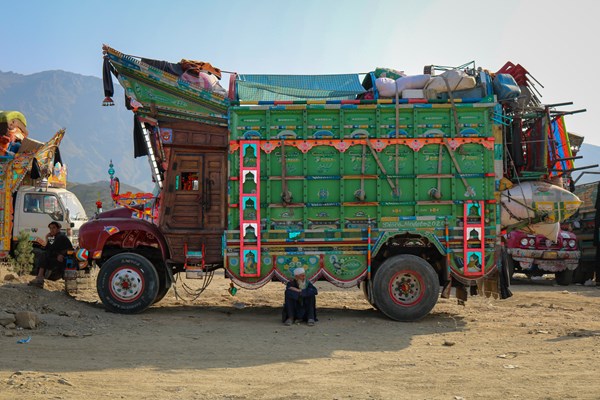
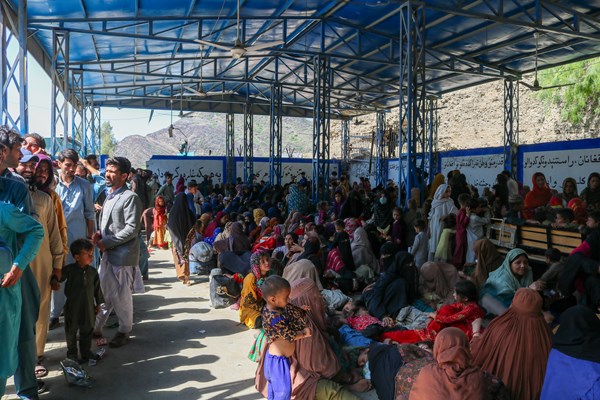
Scattered Lives in Transit
After crossing the border in Torkham, one of two official border crossing points, Afghans wait in line to be registered by the authorities. Registration is the first step to enable individuals and families to document their returnee status in Afghanistan. Many of those returning were in fact born in Pakistan and don’t have any legal documentation for Afghanistan. We met several families who had left the country during the Soviet invasion close to 50 years ago. Their entire families, children and grandchildren, were born in and call Pakistan home.
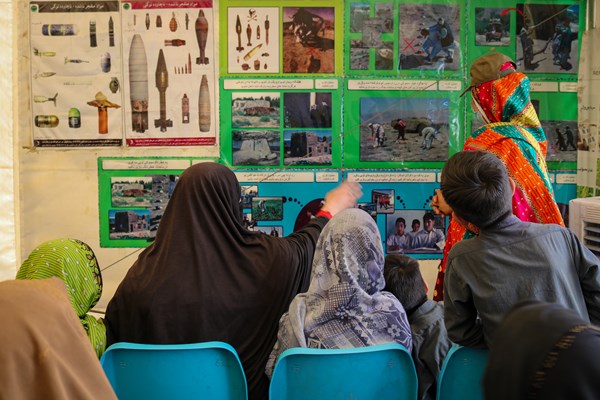
Once they are registered, they receive some services, including medical care and essential information to navigate safely Afghanistan, including on their legal rights and on the risk of mines associated with mines and unexploded ordnance (UXOs).
Currently, 8 out of 10 accidents related to explosive ordnance (EO) are amongst children. In 2024 alone, at minimum 549 persons were injured or killed as a consequence of explosive ordnance.
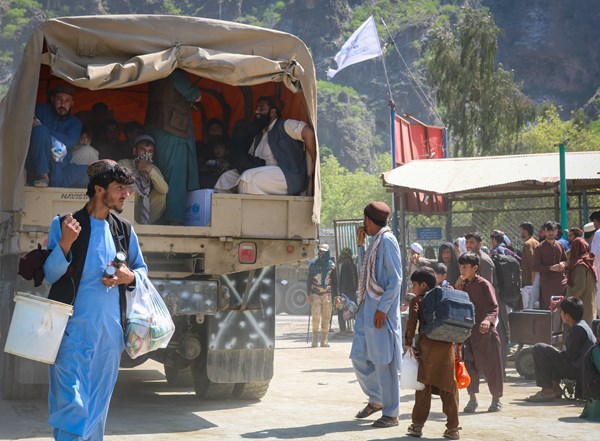
Next, they transfer to a transit camp, where they receive cash and transportation assistance to cover their immediate needs. Families separated by police arrest and detention wait there to be reunited with their loved ones who will arrive on buses filled with deportees, most often at the end of the afternoon.

Mehrab crossed on April 9. Cows, tractors, machinery; everything that he relied upon for his living, he was forced to leave behind.
“We are kuchi [nomadic herders] people, we always have lots of animals. Now we do not have anything; not even a hen.”
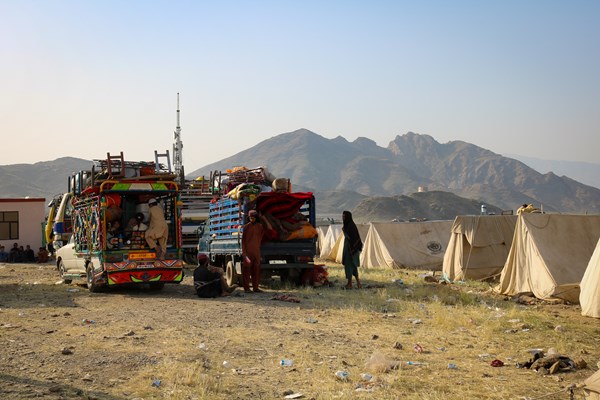
Thousands of families each day get ready to leave the transit camp. Some have no idea where they will go to, but they know they can’t stay in transit indefinitely.

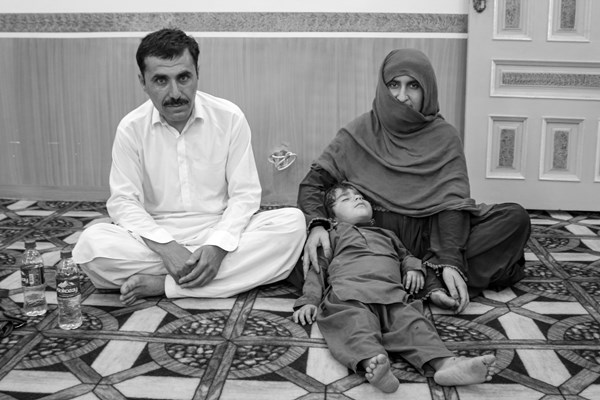
Back but not Home
Some like Sorco and her husband, Manzar Khan, only crossed with the clothes on their back.
Manzar Khan’s shop was closed by the police and he was brought to the police station. He was asked to call his family and tell them to go to the station. They left everything behind. “We only had clothes on our backs.” They say they were well treated at the police station and provided with medical services. He felt lucky as he had heard that many Afghans were facing harassment and poor treatment.
Both were born in Pakistan, after their parents left in 1979, fleeing the Soviet Invasion. Manzar Khan’s father was from a village in Paktya, a place which is foreign to them. They now have nowhere to go. And yet, there is hope, should they receive enough support to allow them to rebuild. Manzar Khan is a skilled solar panels repairman.
“I am hoping to restart my business and use my skills here in Afghanistan. But the education for my children are my first priority. Education is everything.”
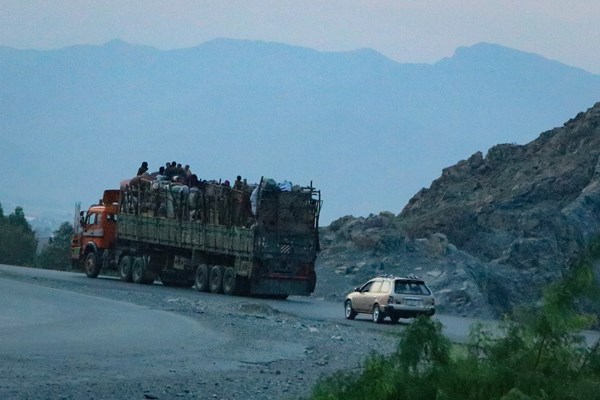
Families have to choose where in Afghanistan they will go. Sometimes, it will be their areas of origin, where their families once lived but for many there is nothing to return to there, and they have to make a difficult decision on where to settle instead.
Nawab was deported with his wife and their 8 children. He has no land and no home in Kunduz province, Afghanistan that he left behind 25 years ago. “I will go where I can go. I have no idea what will happen once we leave the reception camp. Only Allah knows what will happen to me.”
For hundreds of thousands of Afghans, such returns are not the end of their struggles, but another chapter of displacement. Too many have no homes, no legal documentation, and no community to return to. They all deserve a chance to rebuild with dignity.
For more information or to arrange an interview, please contact:
DRC Regional Advocacy and Communication Coordinator, DRC Asia & Europe Regional Office, [email protected], +32 488 283 465
DRC Afghanistan, Access and Advocacy Coordinator, [email protected], +33 687 668 741
© 2025 DRC Dansk Flygtningehjælp